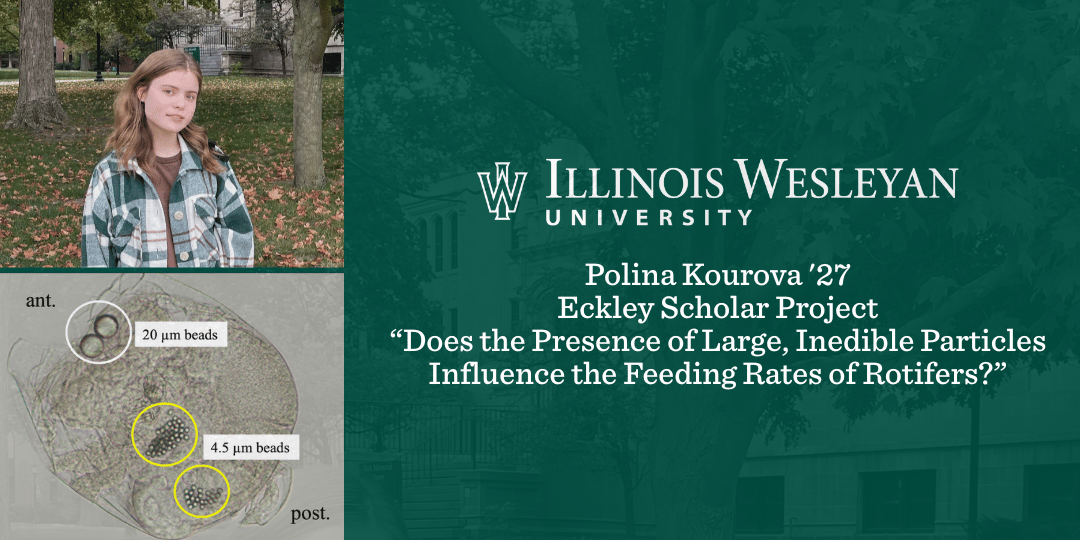
BLOOMINGTON, Ill. — Biology major Polina Kourova '27 spent her summer as a 2025 Eckley Scholar studying the feeding habits of some of Earth’s tiniest diners — the Brachionus manjavacas rotifer.
“Rotifers are marine invertebrates that play a crucial role in aquatic ecosystems
around the world. They typically consume algae and bacteria of a particular size,
but in nature they are exposed to particles of different shapes and sizes, which may
impact their capture and ingestion rates,” said Kourova.
These microscopic creatures are among the first consumers of lake algae and bacteria
in the food chain. Kourova said studying feeding patterns on this base level can help
biologists better understand these animals and their impacts on the environment.
“This is important, because sometimes changes in rotifer feeding behaviors may indicate
a change or a disruption in the larger ecosystem, such as the presence of harmful
algae blooms in lakes,” said Kourova.
Using varying sizes of polystyrene beads to represent prey, Kourova’s research tested how the presence of large and supposedly inedible particles might interfere with the rotifers’ ability to ingest normal-sized prey. After the rotifers were exposed to the beads, they were viewed under a microscope to count the number of beads inside their digestive systems.
By examining the size of beads consumed by the rotifers, Kourova’s data suggests that
a higher concentration of large, inedible particles in the ecosystem may have a noticeable
negative effect on feeding.
“Additionally, we found out that some rotifers were able to ingest the oversized beads,
which was a previously unreported ability, and something we didn’t anticipate in the
planning of this experiment,” she said.
Kourova was assisted in her research by Semour and Dianne Galina Endowed Professor of Biology Will Jaeckle, who introduced her to literature on the feeding habits of rotifers and other invertebrates.
“He also showed me how to take high quality images of our specimens and explained how to best analyze my data. I really learned a lot this summer and I’m incredibly grateful to Dr. Jaeckle for his thoughtful guidance and support during this project,” she said.
Kourova said the opportunity to conduct research as an Eckley Scholar helped improve her academic writing ability and learn how to present her results in easy-to-read graphs and tables. She plans to continue her research this semester by studying how the freshwater rotifer Brachionus calyciflorus eats and processes cyanobacteria, and how the presence of these bacteria affects its behavior and growth. After graduating from IWU, she will continue her graduate studies in biology.
“I believe my Eckley project really helped me develop useful skills and knowledge, as well as get a better idea of what the research process entails,” she said. “I am extremely grateful for this experience and the opportunity to contribute to biology research going on at Illinois Wesleyan.”
Established by the late IWU President Emeritus Robert Eckley and his wife Nell, the Eckley Summer Scholar program provides a stipend for each scholar to spend the summer conducting academic research or artistic activity under the mentorship of a faculty member. The program is designed to develop and deepen a student’s creative and research competencies.